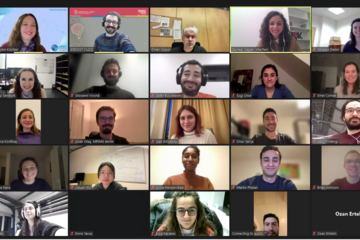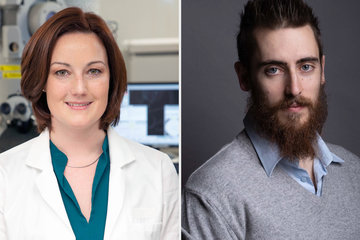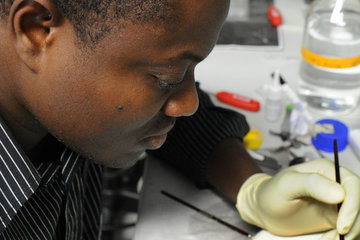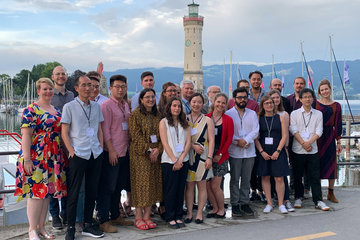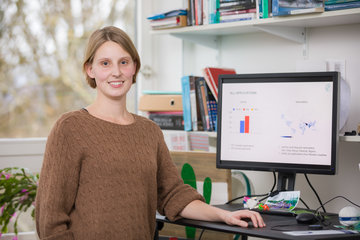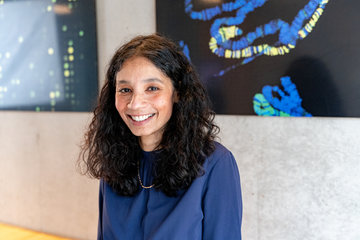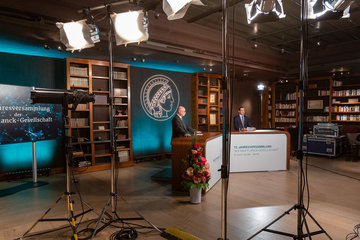50 million euros for junior scientists
Max Planck Society is improving the education and training, as well as career conditions for its doctoral students and postdocs
The Max Planck Society is reorganizing its support of junior scientists. The whole package consists not only of new support structures and detailed supervision guidelines, but is also intended to provide more transparency for career paths in the future. The Max Planck Society is therefore increasing the funding for the support of junior scientists by nearly 40 percent. This will ultimately mean around 50 million euros a year. “We have decided not to invest these funds in the growth of our organization, but in the support of junior scientists”, Max Planck President Martin Stratmann explains. The decision follows extensive discussions and consultations in the governing bodies of the Society.

Over 3,400 doctoral students conduct research in the Max Planck Society. The share of non-German nationals, at 54 percent, is significantly higher than at other research facilities or universities in Germany. However, the international competition for young, creative talent is increasing: “It is therefore essential for us to develop our career structures continuously, in order to remain competitive with the best international institutions”, says Martin Stratmann. Making a career in research more attractive in this country is one of the most important goals of the German Federal Government, Federal States and research organizations.
In future, the Max Planck Society will equip all doctoral students who are performing research at a Max Planck Institute with a Max Planck support contract. Up to now the majority, in particular the non-German doctoral students, had a grant. “That is quite usual internationally”, Martin Stratmann explains. “But the duality of contract and grant has become increasingly unacceptable, because they have not been sufficiently distinct.” The Max Planck support contract allows the scientific freedom of a grant to be combined with the social security of an employment contract. Before the start of the doctoral work, the support contract is entered into for a term of three years, with the possibility of a 12-month extension. “This gives doctoral students a clear perspective for their dissertation project”, Stratmann stresses.
The Max Planck Society has revised its guidelines for the training of doctoral students. Among other measures, in future all doctoral students should have a second independent scientist in an advisory capacity alongside their supervisor who takes the main responsibility. The total number of doctoral students per supervisor should be selected to ensure good supervision. “We aim to set a standard in the German scientific system with these guidelines”, says Stratmann. “In addition, we must provide more support with professional orientation, since over 90 percent of doctoral students will not remain in academic research.”
For the first time there are also specific guidelines for the International Max Planck Research Schools (IMPRS), which the Max Planck Institute operates in cooperation with universities and other research facilities in Germany and abroad. The year 2000 saw the start of the first IMPRS; there are now 60 IMPRS which offer the possibility of a structured graduate education with a defined curriculum. Over half of all Max Planck doctoral students complete their doctoral studies in the framework of an IMPRS.
The spokesperson of the PhDnet, the representation of PhD students at the Max Planck Society, Prateek Mahalwar, is delighted: "This change will improve the situation of MPG's young researchers even further. Young researchers are essential for every research organization, listening to their concerns and working on them, will further strengthen the Max Planck Society as a research organization. I am looking forward to working, together with the MPG's governing bodies, on the further development of the environment for MPG's young researchers."
German State Secretary Cornelia Quennet-Thielen (Federal Ministry of Education and Research) welcomed the decision at the meeting of the Senate of the Max Planck Society: “The new Max Planck Society guidelines on the education of doctoral students set an example for a better support of junior scientists, which allows better planning and dependability. I fully expect that the announced guidelines for the postdoc phase and further career steps will be just as ambitious.“
It is already clear: In the future, postdocs will receive employment contracts in line with the Collective Wage Agreement for the Civil Service (TVöD). Grants will only be awarded to scientific guests who are researching at Max Planck Institutes on a particular project and for a limited time. These Max Planck Fellowships will be linked with a new guest programme that will be specified at the level of the Institutes. “Some Max Planck Institutes have already had excellent experience with international guest programmes”, says Stratmann.
The new support structure will come into effect on the 1 July 2015. Grants which are already running will not be affected. The changeover to support contracts for doctoral students as well as the employment of postdocs with a TVöD contract is also a major effort for the Max Planck Society, as the increased expenditure in the personnel area should not come at the cost of the research conditions at the Max Planck Institutes. “The infrastructure and the possibilities for research at the Institutes are highly appreciated by the junior scientists. In order to increase our attractiveness as an employer, we must maintain this standard and invest additional money in the support of junior scientists”, says Stratmann.
The new support structure was devised by a working group headed by Vice President Bill S. Hansson. An additional part of this comprehensive package for the further development of the educational and career conditions of junior scientists in the Max Planck Society is the guidelines for the supervision of doctoral students. These were compiled by a commission under the leadership of Reinhard Jahn and with the participation of external experts, and approved in the Senate meeting of the Max Planck Society on 13 March 2015. Work in progress includes the programme for career planning for doctoral students and postdocs, as well as an extended concept for the representation of doctoral students in the Max Planck Society. After the reorganization phase, the new support structure will cost around 50 million euros per year. The funding for the reorganization of the remuneration structures comes from the budget increase from the Joint Initiative for Research and Innovation II of the German Federal Government and Federal States.


